Only Monsters Play God, or, my October 2025 in media
I had planned for my October to follow a pretty standardly Halloween vibe: scary books, lightly spooky movies. But I am who I am, so after one attempt at capital H horror I went straight into World War 2 and three shades of Frankenstein. But, let’s be real, what’s scarier than world-wide conflict, genocide, and scientists playing God?
Let’s talk media!
BOOKS READ:
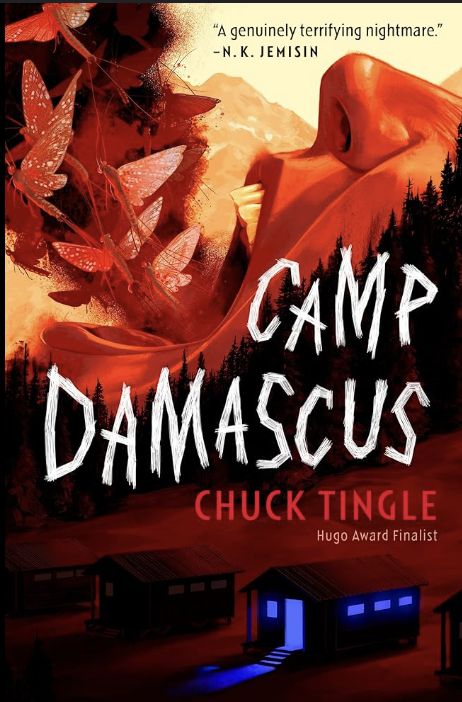
Camp Damascus by Chuck Tingle (2023)
Format: Paperback (Titan Books)
Chuck Tingle, award-winning author of such short-form indie erotica as “CONSERVATIVE POUNDED BY THE REALIZATION THAT THE PROTEST MUSIC HE GREW UP ON DOES NOT ACTUALLY SUPPORT HIS CURRENT HATEFUL IDEOLOGY”, has gone semi-legit and is writing surprisingly earnest gay horror.
Camp Damascus follows Rose, a 20 year old soon-to-be high school graduate who has been raised in a hardcore evangelical home in a town famous for it’s eerily effective gay conversion camp. But that has nothing to do with her — she’s never been anywhere near the camp. Why would she? She’s not gay! But why has she suddenly started seeing a terrifying demon every time she thinks totally normal complimentary thoughts about her new female bestie? And why can’t she stop vomiting clouds of flies whenever she lies to her parents?
Being from a fairly secular family in a fairly secular country, I find myself fascinated by the horrors of evangelical America. Camp Damascus has a lot of interesting ideas going on, and feels firmly situated in the political reality of modern America, where the Christian right probably would make deals with demons to shape the world to their liking if that was ever an option. There were moments here that really made me sit with the plight of queer kids stuck in uniquely hostile landscapes across the USA.
But unfortunately, on the whole, Camp Damascus underwhelmed. The writing suffers from a few issues, most annoying of which is something I’m coming to think of as “cold liquid” syndrome, which is when an author over-describes common objects and substances that really don’t need it. For example, Tingle gives us “hot, brown liquid," “silver rectangle," and “rectangular device” when leaving things at “coffee,” “laptop” and “vending machine” would have been… fine. Preferably, even. It’s a fairly common habit of early career authors, particularly in the YA space (if this book is that, I have genuinely no idea what to make of a 20-year-old high schooler) so I’ll be interested to see if it continues in his other trad-pubbed books, of which there are now several. But while this trait gets my particular goat, the greater sins were the meandering plot and the lack of conflict. Everything in this book happens far too easily, from Rose’s realisation that she’s been lied to, experimented on, and sold to a literal demon by her parents, to her pre-programmed romance, to the defeat of evil. The good characters are all uncomplicatedly good, and the bad characters are all uncomplicatedly the fucking worst. It makes for a quick, very easy, and oddly Wholesome(TM) read, and, if that’s what you’re looking for, then I have a nice book rec for you! But, aside from a few lines that made me cackle (Tingle is, after all, a very funny guy) this was mostly a miss for me.
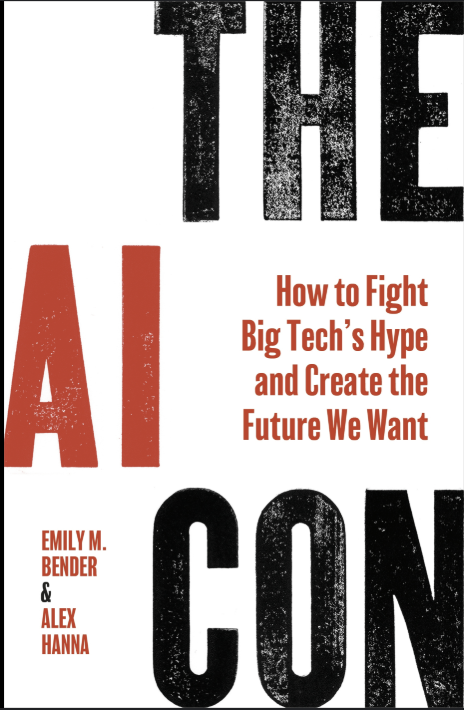
The AI Con by Emily M. Bender and Alex Hanna (2025)
Format: Audiobook, performed by Jade Wheeler
I’ve added yet another book to my growing collection of anti-AI non-fiction. It couldn’t be helped: I needed something to listen to while gardening, and the authors impressed me enough during a guest spot on the Tech Won’t Save Us podcast to drop a credit on them. Also, let’s be honest, I like it when people say mean things about Sam Altman.
Of all the anti-AI literature I’ve read this year, The AI Con is easily the one I’d recommend for people with no tech background to help them understand how chatbots/LLM’s actually work (which is one of the better ways to safeguard vulnerable people against falling into AI psychosis… even if that psychosis is just a very low-level, seemingly harmless belief that the chatbot is a thinking, feeling being) and the various ethical, environment and economical concerns around their use and expansion.
It’s super short, a little bit snarky, and would make a great Christmas present (passive aggressive or earnest, up to you). Give someone you love the gift of understanding what the fuck the tech dudes are talking about so that they can fully appreciate what malignant bullshitters most of them are.
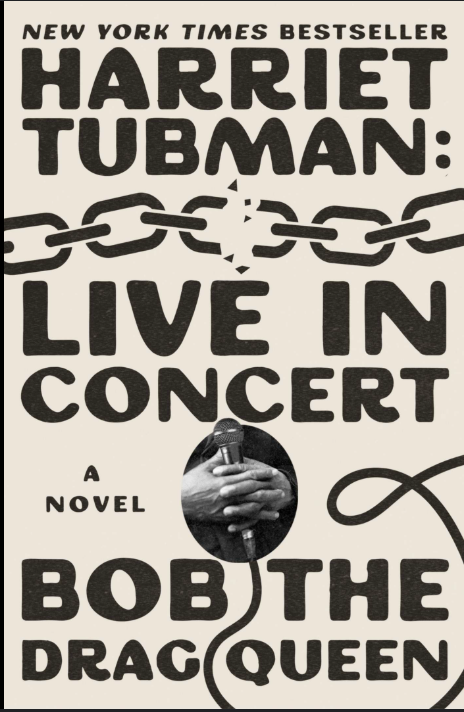
Harriet Tubman: Live in Concert by Bob the Drag Queen (2025)
Format: Audiobook, performed by Bob the Drag Queen
I’ve been a fan of Bob the Drag Queen ever since she walked into the Ru Paul’s Drag Race work room purse-first, and while it’s rarely a satisfying experience when a person you like for non-writing reasons writes a book, this time, I was cautiously excited. Bob’s always been clever, curious, plugged into the world and great with words, all of which are solid foundations for someone who wants to write.
Harriet Tubman: Live in Concert is a work of short speculative fiction set in what seems to be a modern day USA. The spec element? Various figures from history have spontaneously reappeared, alive and in their prime. Harriet Tubman, along with her brother and some of the people she freed, wants to tell her story in her own words to a new generation, so she pulls in protagonist Darnell Williams, a washed-up music producer, to help her put together her first album. And while Darnell isn’t sure he’s up to the task, Harriet’s not taking no for an answer.
This setup allows the book to take on a kind of long-form gonzo journalism format, with Darnell effectively interviewing Harriet and her band about life under slavery while they drop some commentary on America, then and now. Harriet Tubman: Live In Concert is a real tribute to Black Americans, Black history and Black music while our protagonist grapples with the unique difficulties that have come with being Black and gay, Black and gay and christian, and Black and gay and kind-of christian in the music scene. The tone occasionally verges on after school special, but it’s easy to forgive when the overall project of the book is so clear and so solid. All in all, it’s an interesting take on a historical figure that, judging from the videos Bob’s been stitching on TikTok, some of the youths desperately need. And as a fun bonus, the audiobook comes with two original songs that really don’t suck.
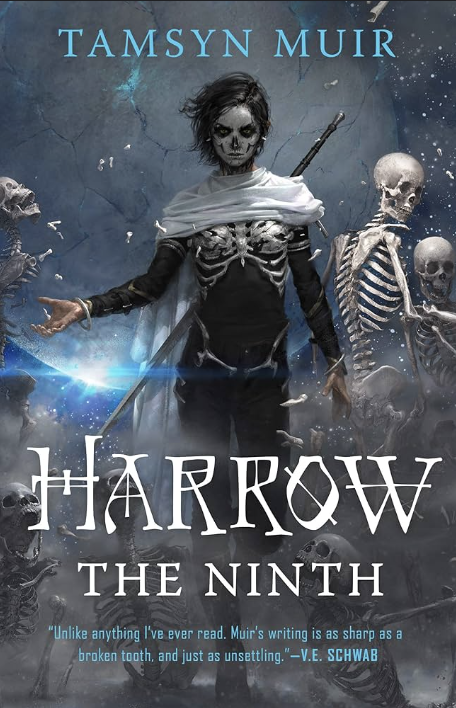
Harrow the Ninth by Tamsyn Muir (2020), book two of The Locked Tomb series
Format: eBook (Tor Dot Com)
I don’t know how to talk about The Locked Tomb without sounding like an insane person. I especially don’t know how to talk about book two in an as-yet-unfinished series of 500+ page books without writing some sort of treatise. But let’s try it.
The as-yet-unfinished Locked Tomb series is science-fantasy space opera brimming with lesbians, necromancers, memes, goth shit, and a quintessentially Kiwi humour and vernacular that the rest of the world seems to have taken for inventive sci-fi whimsy. The books (kind of) follow two of the loneliest, saddest girls in the universe (who are stuck with each other, and are very mean, and hate each other, but also they’re the only friend the other one has ever had, which is something they are also bad at because they’ve both been abandoned by every adult who should have looked after them) who become accidentally important to the galactic god-emperor in a way neither of them really appreciates. The books are very funny and very sad, the plot is quite complicated, the world-building is a lot but also drip-fed, and each book requires you to sort of trust the process and keep track of things in the faith that it’ll all come together in a satisfying if maybe a bit devastating way, which they do. In fact, they are put together so well that every time I re-read them (this is my second time reading Harrow, but for reasons I can’t explain sensibly I have read it’s predecessor Gideon The Ninth 3.8 times) I feel like an absolute berk for having been so confused the first time round.
These are not books I’d recommend to just anyone. Partly because we have no idea when the fourth and allegedly(??) final book is coming out, and partly because I’m still mad at Tamsyn Muir for the none pizza left beef moment. And if that sentence means nothing to you, then you are not someone I’d recommend this overly online thirty-something evil genius gobshite to.

In conclusion: five stars, I love these books so much.
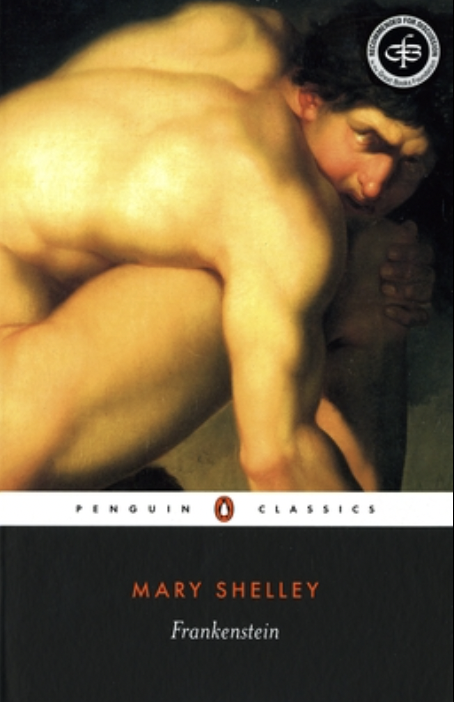
Frankenstein by Mary Shelley (1831)
Format: Paperback (Penguin Classics) and audiobook, performed by Dan Stevens
I’d been meaning to revisit Frankenstein ever since Brian Merchant made a compelling argument for it as a consciously Luddite text in Blood in the Machine (his excellent history of the Luddite movement and its parallels with the labor movements of today).
Buuut I got distracted.
And then the plan was to read it before seeing Guillermo Del Toro’s screen adaptation a.k.a. my most anticipated movie of the year/decade, but I only managed about two chapters before I got distracted again. Luckily, the movie threw me into a bit of a Frankenfixation and I ate it up over two days.
Frankenstein is an interesting book. Like Wuthering Heights, it’s a real nesting doll of a narrative: the creature’s story told to Victor Frankenstein, told to Robert Walton, told to his sister in a series of VERY DENSE letters. Through a lot of very verbose men emoting at each other, it explores the dangers of callously pursing scientific advancement without bothering to consider (let alone care about) any of the ethical repercussions.
Insert the evergreen Ian Malcom line here.
In Victor Frankenstein’s case, he seeks to create new life from the remnants of the dead and, in succeeding, is so horrified by the unnaturalness what he’s done that he abandons his creation. The repercussions of this are borne by the people Victor loves as the creature picks them off one by one, torturing Victor in punishment for damning him to a life alone, and with a monstrous visage that seems to render him impossible of being shown any human affection. The solution the creature demands is a female mate, which Victor eventually denies, having learned his lesson far too late. A simpler, fairly obvious solution would be for Victor to take the creature in, and for the two of them to be companions to each other, but this doesn’t occur to Victor, and the creature already seems to know better than to ask.
Much like the tech-billionaires I’ve been reading about all year, Victor Frankenstein has no real interest in the arts or the humanities. All he needs (or so he thinks) is scientific theory and cold logic (STEM, BABY), and it leads him, everyone around him, and the creation itself to ruin, which makes 2025 a pretty perfect time for Mary Shelley’s work to hit our screens again.
But more on that in a bit.
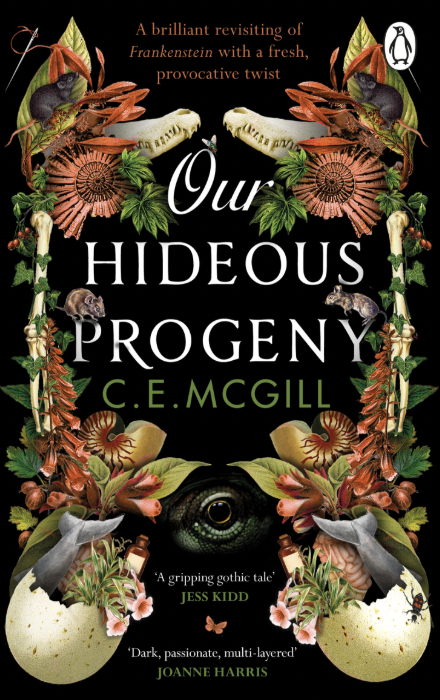
Our Hideous Progeny by C.E. McGill (2023)
Format: Audiobook, performed by Florence Howard
I first read Our Hideous Progeny in March of 2023, when a friend at Penguin sent me an advanced review copy on the inkling it would be Entirely My Shit. Well, she was right, and I’ve talked so many people into reading this book (who have gone on to recommend it to others, and so on) that there have been recurring jokes about my downline. Alas, I am still waiting on my convertible.
Our Hideous Progeny follows Mary, Victor Frankenstein’s illegitimate grand-niece and aspiring palaeontologist who, while grieving a stillborn child and the sudden revelation of her recently blacklisted geologist husband’s steep gambling debts, discovers Robert Walton’s letters in the lining of a suitcase. If that sounds like a lot, we’re only getting started. There’s also Mary’s growing friendship with her husband’s disabled sister, her troubled past on the isle of Wight with a cruel grandmother, her kind Indian mentor, a rat-bastard villain, complicated feelings about motherhood, dinosaurs, murder! But it’s okay, because it all somehow works. This is a beautifully constructed, slow-burn character piece that explores, recontextualises and pays tribute to the story and themes of Frankenstein while also building something entirely new. McGill strikes a perfect balance between old and new, and of the three Frankensteins I enjoyed this month, Our Hideous Progeny remains the fave.
MEDIA WATCHED:
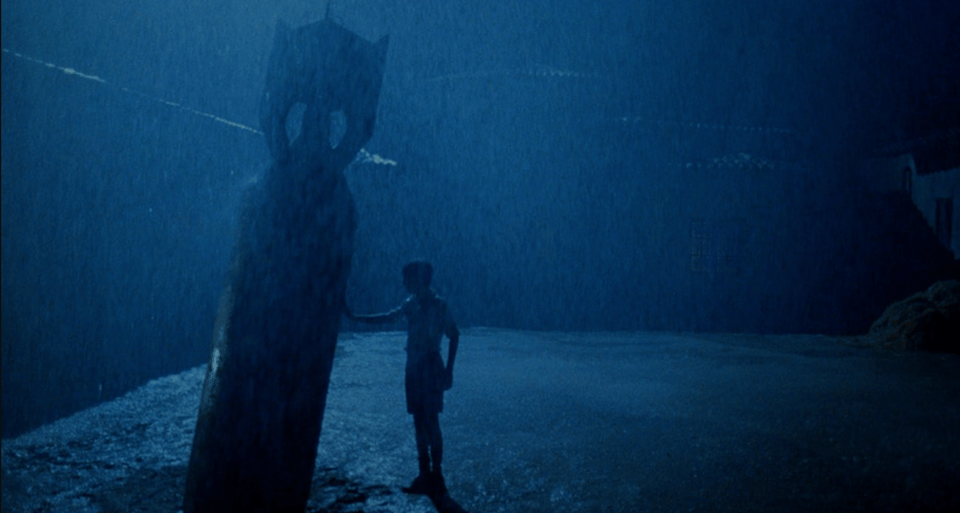
The Devil’s Backbone (Dir. Guillermo Del Toro, 2001)
Owned on DVD
I recently found an ancient DVD wallet I thought I’d lost in one of my many moves, and inside were many absolute gems from my earnest little film student days (alongside some delightfully crap anime). Among them was Guillermo Del Toro’s The Devil’s Backbone and, given that my partner had never seen it before, we devoted a night to it. And oh, what a brilliant life choice.
The Devil’s Backbone is a spiritual little-brother to Del Toro’s Pan’s Labyrinth (and, I’d argue, the two of them make a gorgeous trilogy with his Pinocchio, but only marathon them if you like crying a lot). The main narrative follows young Carlos who, unaware that he has been orphaned, is dropped off at an isolated boarding school by comrades of his father during the height of the Spanish civil war. But his father’s death isn’t the only secret in the air. The boarding school has many of its own: an unexploded bomb in the courtyard, money troubles, a secret stash of rebel gold, an affair, a ghost, a murderer. And all the while, Franco’s men draw ever closer, posing an existential threat to the anti-Nationalist headmistresses and everyone under her care.
So many of what would become trademarks of Del Toro’s voice and vision are on display here. A soapy sensibility with multiple high drama storylines tangled up in one visually striking location, an innocent hero, a deep hatred of fascism, humans as monsters, monsters as saviours, a high body count, and courage and kindness always, eventually, winning out over cruelty. But despite the sheer amount of story going on, Del Toro’s script deftly braids them all together. The Devil’s Backbone is rich, engaging, and enormously satisfying. And while it isn’t as visually opulent as most of his later films, he and cinematographer Guillermo Navarro find the beauty in this ramshackle school and the wide desert it stands in.
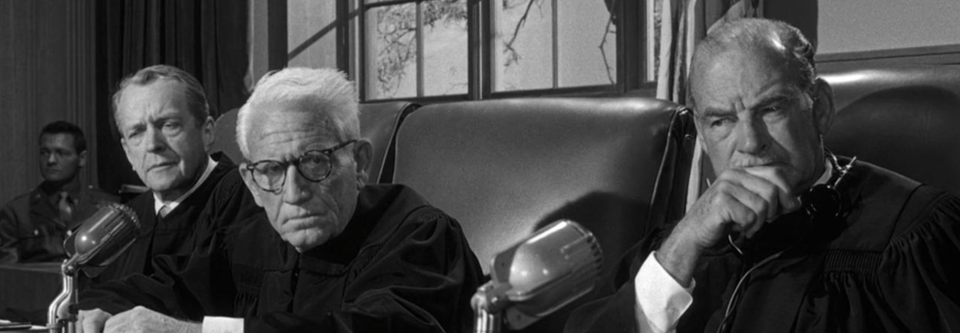
Judgement at Nuremberg (Dir. Stanley Kramer, 1961)
Streamed for free on YouTube
Despite my aforementioned past as a film student (and, frankly, not a very good one), I can in no way be considered a cinema buff. Ergo, I had never heard of Judgement at Nuremberg until a political film account I follow on instagram (@reclaim_cinema) posted a series of screenshots from one of its climactic monologues. The dialogue was pretty fantastic and the concept seemed interesting, so off I went to find a stream to put on in the background while I went about my work.
And GEE-WILLIKERS, did I work slowly.
Judgement At Nuremberg is a fictional (and fairly simplified) account of one of the many trials held at Nuremberg in 1945 and 1946. We follow Dan Haywood, a humble, retired American judge over the course of a year as he leads a military tribunal against a group of German judges accused of propping up the Nazi agenda and knowingly committing “crimes against humanity.” The trial is, as you’d expect, passionate, with the prosecution led by a US Army Captain who was present at the liberation of Dachau concentration camp and whose every action in the film is haunted by what he saw there (shown to us in graphic detail by actual footage of such a liberation, only slightly recontextualised here as being filmed by his character), and the defence by a charismatic German lawyer who puts the entire world on trial. As the trial plays out, Haywood gets to know the German staff in the house he’s renting, falls a little bit in love with the proud widow who owned the house before her husband, a Nazi officer, was executed by the Allies, and the really very likeable people of Nuremberg as a whole. On top of ALL of this, cold war conditions with the Soviet Union are unfolding quickly, and the Allied judges brought in to deliberate over the accused Germans are pressured to go easy on their sentencing in order to win vital German co-operation against the Soviets.
This is a rich film. Despite the banger monologue that brought me to it, I had no idea what to expect from a 1960s American-made film about the aftermath of World War other than, probably, a lot of pro-US propaganda. But I was pleasantly surprised, and completely engaged, by what is ultimately an incredibly nuanced narrative that delivers no easy answers or excuses. Haywood is charmed and repulsed by what he finds in Nuremberg. The people are wonderful and kind and cultured, but whenever he brings up the institutionalised massacre of Jewish people he’s met with defence and derision. “We didn’t know,” says every German character when faced with the idea of the holocaust. “We didn’t know. We didn’t know. Very few Germans knew.” But the defence of the common Nurembergian shifts the longer he persists: “We didn’t know. But if we did, what could we have done?” “If we didn’t know, it’s because we didn’t want to know.” The banality of evil is emphasised, but subtly so, and the Allied forces aren’t spared their own slew of dark — and justified — accusations of the same.
It’s a fantastic script by Jewish screenwriter Abby Mann, which unsurprisingly won the Oscar that year, and it’s brought to life by some staggering performances (Judy Garland and Marlene Dietrich are here!) and really clever stagecraft. The Nuremberg Trials were conducted in multiple languages and translated through headphones, and that convention is upheld here, but with neat visual solutions that spare us from having to hear everything in German and then English, or vice versa. This is a film that goes for emotional and historical realism while baldly taking advantage of theatrical conventions, trusting the audience to roll with it. It’s such a cool dichotomy, and I wish more filmmakers would embrace it (she says smugly, while her favourites already do).
All in all an incredible film, particularly so for the way it was able to bring in fifteen years worth of distance and perspective to the post-war period, and a much-needed reminder for me to explore more films made before the 1980s. I’d watch this again in a heartbeat.
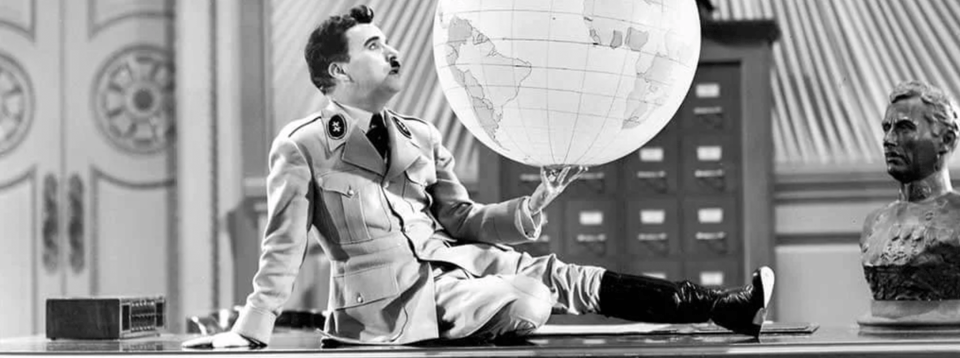
The Great Dictator (Dir. Charlie Chaplin, 1940)
Streamed for free on YouTube
And lo, I followed this brain worm back another twenty years and finally watched Charlie Chaplin’s The Great Dictator. I tend not to enjoy many modern comedy films, but I’ll own to being a fan of physical comedy and funny voices of the not-racist variety. Ergo, my hopes were moderately high for this film, having seen and chortled at one of Charlie Chaplin’s earlier, silent movies before.
But in addition to wanting a bit of a laugh, I was intrigued as to what shape this movie would take. I’d seen the iconic closing monologue quite a few times in isolation, so I knew where it ended up, but nothing about the path it took to get here.
What we get is a bit of a prince and the pauper storyline, in which Charlie Chaplin plays a humble Jewish barber who, after saving the life of a Tomainian commander on the Western Front, is rendered insensible and amnesiac by his injuries for twenty years until the hospital turfs him out. Blissfully unaware that Jews are now being violently oppressed on the orders of newly-risen-to-power Tomanian dictator, Hynkel (also played by Chaplin), he returns to his barbershop in the ghetto and accidentally starts a Jewish resistance by standing up to the stormtroopers, who he thinks are common thugs. The story is then split between the barber’s burgeoning romance with a local Jewish washer woman as they lead a resistance movement with their friends and neighbours, and Hynkel’s attempts to form an alliance with (and prove he’s more of a man than) the dictator of Bacteria, Benzino Napaloni, so that he can invade Osterlich. Hynkel’s plan comes together just as the barber and his friends have conceded their homes and fled to Osterlich, and so the mix up leading to the final monologue can occur. Narratively, it’s pretty loosey goosey (we’re talking early cinema here!), relying on the absolute charisma of Chaplin to keep the audience engaged.
And it works! This movie had me in stitches — the highlight being a scene involving a coin in a pudding — while also being quite an earnest and moving attempt to undermine Hitler while showing Jewish people as… people. An unfortunately shocking concept, particularly in 1940. In context, the final monologue is well placed, tying the film together with the slightly bewildered sincerity it starts with, even if it does seem incredibly naive to think that one beautiful speech on kindness and democracy could have derailed the Nazi agenda.
But that’s something that makes this film particularly interesting. It was written and began filming prior to the outbreak of World War 2 (there were fears it couldn’t even be shown in Britain, who at the time had a policy of not pissing off Hitler), and was released when the war had only just begun. It’s an incredible insight into what was widely known about Nazi operations at the time, and what wasn’t. Concentration camps are explicitly mentioned, as is the fact that Jewish people were already being disappeared into them, the murder of Jews within them suspected and alluded to, but not yet at an institutional scale (the extermination project was still a few years away). Still, it’s clear that Hitler’s intentions and methods were neither a secret, nor much of a surprise, whatever people might have said after the fact. And laying this very well-meant comedy beside Judgement at Nuremberg (in the same month that I watched Democrats across America make very quick excuses for a candidate with an S.S. tattoo, while the most far-right, anti-immigrant party in Australia reported its highest polling numbers in history, and while we enter the third year of our ally Israel’s active genocide of the Palestinian population) paints a chilling picture that makes me wonder how much of Hitler’s actions people really did, and do, disapprove of.
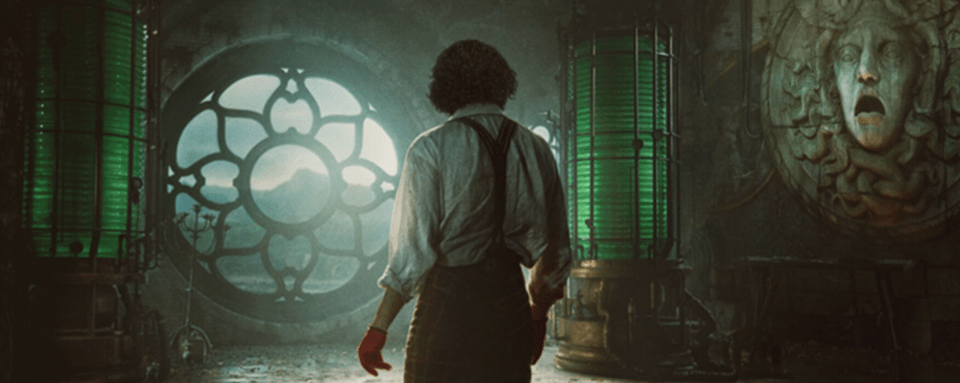
Frankenstein (Dir. Guillermo Del Toro, 2025)
Watched in an honest to god cinema, coming soon to Netflix
What a film! What a project!
Guillermo Del Toro attempts to create his own creature with Frankenstein, taking pieces of Shelley’s novel, her biography, the Hammer film adaptations, and his own family history, and stitching them all together with signature Del Toro flair and melodrama.
Where Shelley’s Victor Frankenstein has an idyllic childhood, Del Toro’s is plagued by the too-early loss of his beloved mother and the open disdain of his surgeon father: a solid basis upon which to build a cold-hearted scientist whose driving purpose is not to create life, as Shelley’s Frankenstein aspires, but to defeat death. It’s a small but significant change that I honestly find far more interesting.
When we meet Victor as an adult, we find him an older man (played by Oscar Isaac, having the time of his life) than Shelley’s bright young thing, in the process of being dismissed from the University in Edinburgh for creating not-quite-alive but definitely-not-dead abominations. His story appears to be ending: his money, position and reputation all but gone, his doorstep caked with blood and presumably attracting complaints from the neighbours. But someone sits in the audience of his final humiliation: Henrich Harlander (Christoph Waltz), wealthy uncle to Victor’s little brother’s fiancee, who wants to fund Victor’s experiments out of a pure interest in science.
In exchange, of course, for an unnamed favour down the line.
What follows is a semi-familiar story in which Victor Frankenstein builds a (beautiful) man out of corpses, then leaves the creature to fend for itself, learn to speak, learn to love, learn to feel abandoned, learn to rage, learn to hurt others. But there are all new steps, new faces, and new twists on the familiar ones. This Elizabeth is not Victor’s childhood sweetheart (which is putting that whole situation mildly) but a young woman fresh from the convent, lately engaged to Victor’s brother William, whose birth killed their mother but whose sunny disposition (and very blonde hair) brought out a love in their father Victor was always denied. Victor is extremely attracted to Elizabeth, and who wouldn’t be. In a movie full of objectively gorgeous people, she’s absolutely radiant, and Del Toro’s script (with a lovely performance from Mia Goth) bestows her with the kind of personality even the most shrivel-hearted scientist would struggle to resist. Her feelings for Victor, however, are more complicated. Her feelings for his creature, less so. And doesn’t that just drive Victor crazy.
This film is so new that I don’t want to spoil any more story elements, which is tricky, because the only critiques I have of this pretty spectacular film are in the narrative. It feels two drafts away from perfect, with so many elements in place for it to be something completely new built from the bones of something old. One particular story thread was so well set up to lead to something that would have made for an incredibly timely, apt critique of tech billionaires (one of Del Toro’s stated goals for the film) and then that thread is just… cut, leaving the character attached to it a fairly pointless presence in the film. And it’s not the only time this happens. The problem, for me, is that Del Toro’s original ideas are such compelling progressions on Shelley’s text that whenever he reverts to one of her scenes, it feels like we’re taking a step back (or sideways), into a slightly different story where nothing quite fits. It’s much more convincing when Del Toro’s creature (played by Australia’s tallest brunette, Jacob Elordi) pleads, gorgeously, “we could be monsters together,” than when he roars the iconic, “you are my creator but I am your master.” The choice to make Victor accidentally create new life in the pursuit of mastering death, thereby forcing him into the role of — and to use the methods of — the man he loathed most in the world is fantastic. It just isn’t combed through properly. Where all the threads of The Devil’s Backbone come together beautifully, they fray in Frankenstein. And that’s a shame and a blessing, because if GDT (my friend, my love) had pulled it off, you’d never hear me talk about another film again. I’d be insufferable.
Instead, I just had to settle for having a great time. Because narrative wonks aside, this movie is fantastic. In another sidestep from the source text, Del Toro has chosen to set his film in (I think?) the 1850s rather than the late 1700s/early 1800s of the text, and thank God because, friends, the SLEEVES alone. Frankenstein is a Gothic Victorian dreamscape/hellscape, with every frame an oil painting of bliss and/or horror. Del Toro loves symbolism, and every set, every costume is steeped in it. It’s not what you’d call subtle — as my favourite Letterboxed review for this film says, “I know writers who use subtext and they’re all cowards” — but sometimes it’s just fun to just see a giant gorgon head leering over a man who might be a monster, and a monster who might be a victim. And as waist deep in AI Slop as we are in 2025, it’s really special to see such a celebration of craftsmanship and practical artistry on screen.
While it’s worth seeing Frankenstein the biggest screen possible if you can swing it (the theatrical release has been limited and not amazingly planned), you can also watch it on Netflix from November 7. I’m really keen to see it a second time and find out if my critiques stand, if they feel a little over-egged, or if I’ve maybe been too kind to my favourite guy in Hollywood.
I’ll let you know how it pans out!
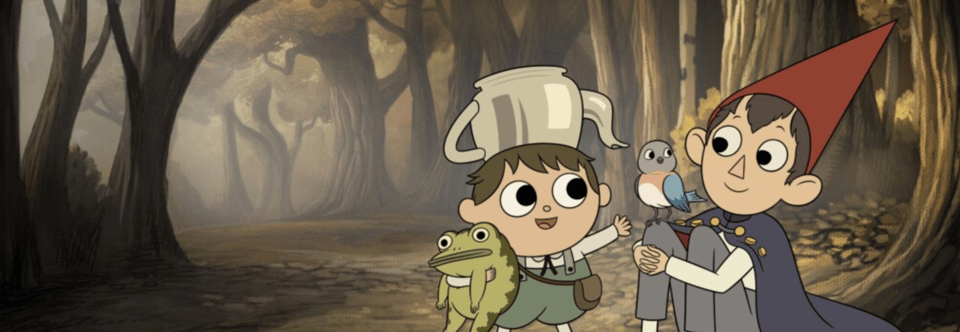
IN SHORT:
- In between Judgement at Nuremberg and The Great Dictator I watched Hitler and the Nazis: Evil on Trial on Netflix. This six-part documentary series tracks the rise of Hitler and the Nazi party alongside footage and re-enactments of the Nuremberg trials, which is how I came to appreciate just how much care Mann took in writing his fictional version. This was a really interesting doco, well put together, and a handy overall primer for the conditions that led to the horrors of WW2. And if you watch it and see a whole lot of parellels playing out in geopolitics right now… well.
- I bought my partner Gattaca on blu ray for his birthday, which is a movie we watched early on in our relationship when we were introducing each other to our favourite movies (this was one of his). I enjoy it as a sci-fi with flimsy logic and a pretty big heart, but it’s also always very fun to watch your partner have Big Feelings over a movie.
- I can’t let an October pass me by without watching Over The Garden Wall, a ten-part animated series about two brothers lost in some magical woods. It’s very American Gothic, very folktale, very coming of age, very funny, very sweet, and very tightly scripted. The episodes are only 11 minutes long, so if you watch them in one go it’s basically feature length. Great for kids with a love of the slightly spooky, and great for neurodivergent adults who like nice things and jokes about frogs.
- I’m only halfway through season three of The Diplomat. Please stay tuned.
MISCELLANEOUS MEDIA I’VE ENJOYED:
Magazines! The shock shuttering of Meanjin, one of Australia’s oldest literary magazines, has been a solid kick up the arse/reminder to support the literary landscape I want to see in the world. So I’ve been subscribing to a few literary mags and journals (Aurealis, Overland, N+1, Clakesworld) and picking up others from local small businesses whenever I spy anything intersting/the newest Frankie comes out.
It’s been a real treat! Whether digital or physical (I prefer digital, but many small publications can’t afford the production costs), there’s been something really wonderful about getting more art, photography, poetry, and short-form fiction and non-fiction into my life, most of which is from completely new-to-me artists and writers.
—
And that was October! Thanks for reading along! If you’d like to yap about any of the books, TV shows, movies or whatever else I’ve posted here, you can click the link below and drop a comment, or you can find me, as always, @feedthewriter on Instagram and Bluesky.
Also, now that I’m fully off substack, it’s a little harder to get eyeballs on the ol’ blog. So if you know of anyone you think would enjoy these reviews and recommendations, feel free to forward this email onward!
-
I cannot do horror to save my life lbr but also cannot resist commenting re: the Ian Malcolm line because my brain immediately went to "dinosaur kills man, woman inherit the earth" lollllll
-
Your writing is always a delight to read. Thank you for the entertaining recommendations, lots added to my “watch later” and audiobook playlists!
Add a comment: